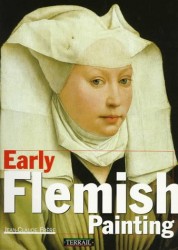
Frère 1997
“Tradition and Innovation – Hieronymus Bosch” (Jean-Claude Frère) 1997
[in: Jean-Claude Frère, Early Flemish Painting. Terrail, Paris, 1997, pp. 137-159]
Bosch’s bourgeois patrons were most attracted by those of his paintings that were typically Flemish, whereas Bosch’s aristocratic clients mainly bought works that depicted fantastic scenes and grotesque monsters, probably reminding them of the grotesque caricatures in old illustrated manuscripts that must have inspired Bosch. Bosch’s success during his own lifetime was in part due to the humanists’s fascination with the strange and the occult. Bosch was the most pessimistic of all Flemish painters and the one who gave fullest expression to the anxieties of his age. The new ruling class, the wealthy burghers, no longer tolerated the lowest ranks of society but saw them as lazy parasites. This was also Bosch’s point of view.
Frère then discusses The Ship of Fools (Paris) and the New Haven fragment, The Conjuror (St Germain-en-Laye), the Vienna Last Judgement, The Cure for Folly (Madrid), The Haywain (Madrid), the Lisbon Temptation of St Anthony and The Garden of Earthly Delights (Madrid). Writing about the Garden triptych, Frère briefly summarizes Fraengers ‘penetrating’ and ‘magisterial’ analysis. The fact that Bosch was buried with full honours of the Church does not rule out the possibility that he was a secret follower of a heretical sect. Bosch did paint a few hermits, but he showed relatively little interest in conventional biblical scenes which he tended to render without any great feeling. ‘This is not in itself concrete proof, but it is perhaps enough to give us pause for thought.’
This general introduction to Bosch is a mixture of sound ideas and questionable statements (e.g. the positive attitude towards Fraenger). Some minor errors: the name Hieronymus van Aecken is translated as ‘John of Aix-la-Chapelle’ [p. 139], Felipe de Guevara is called a ‘client’ of Bosch [p. 140] and the Haywain triptych is said to be based on the old proverb ‘the world is a hay wain, each man takes from it whatever he can’ [p. 146, should be: ‘hay stack’ instead of hay wain]. To call Bosch ‘Flemish’ does not speak in favour of the author’s cultural-historical knowledge.
[explict 16th May 2016]